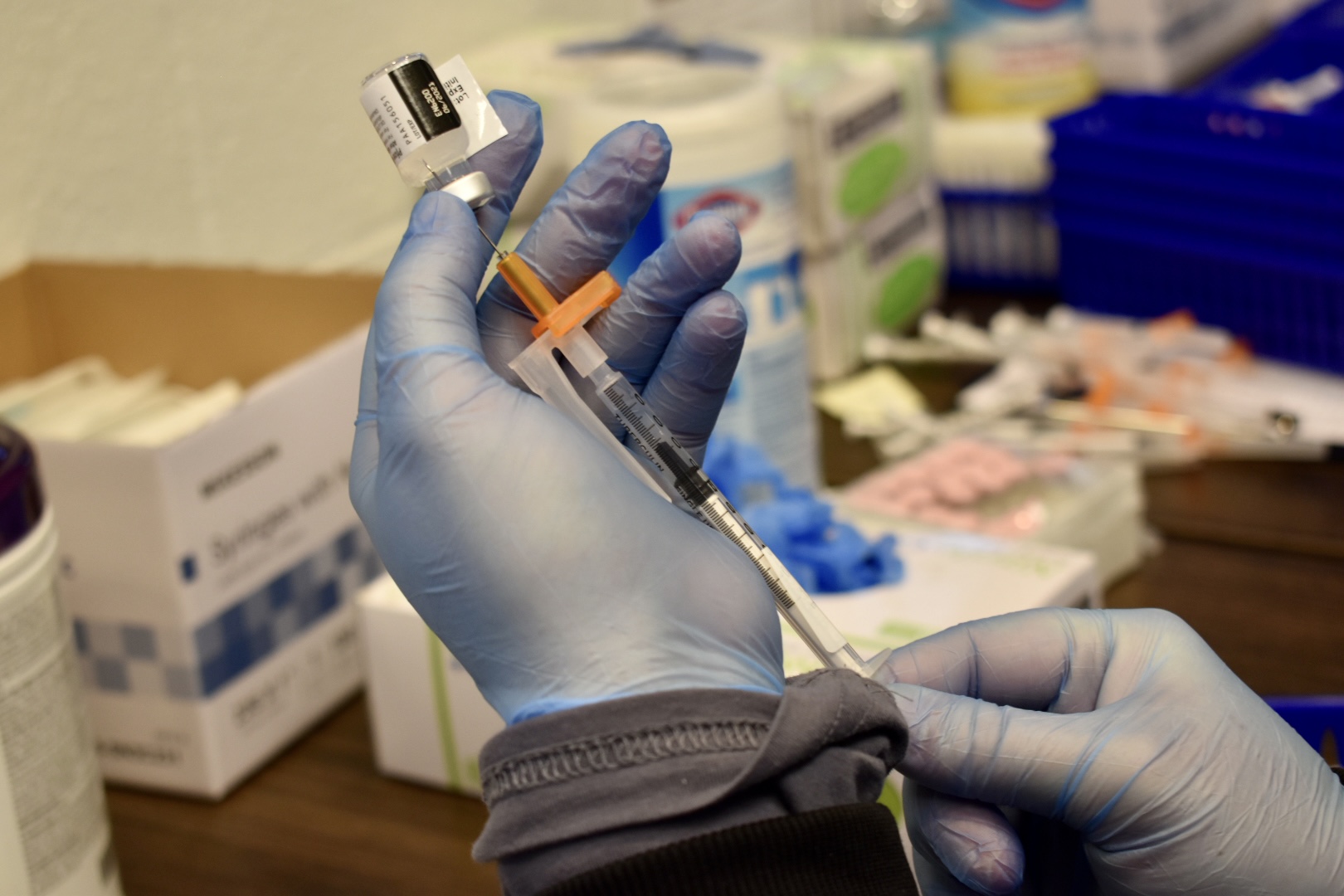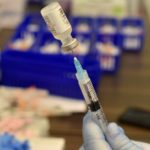
Regina Sung, Contributing Photographer
As students and New Haven residents scramble to book COVID-19 vaccine appointments, one 40-foot-long van and a team of health care workers are driving vaccine accessibility in underserved populations.
The Yale Community Health Care Van is hosting mobile vaccine clinics to try and combat the spread of COVID-19 in vulnerable New Haven neighborhoods. The van has already hosted two clinics in collaboration with churches in Fair Haven — one with Walk of Faith Church of Christ and the other with Una Iglesia Para La Ciudad. The van aims to be a pathway to reducing racial disparities and medical mistrust in COVID-19 vaccinations.
“The van is very much trusted in the community due to our partnership with local organizations,” said Dr. Frederick Altice, a professor at the Yale School of Medicine and founder of the program. “People saw that we had been present in the community for a while and many people that had vaccine hesitancy [thought] if you all are doing this, then it must be okay.”
In 1993, Patrick Altice started the mobile health initiative with the Community Health Care Van. Initially, the van was aimed at providing harm reduction services to those vulnerable to HIV and AIDS. Over the years, its role has expanded to address issues such as drug overdoses, neonatal care, mental illness, and most recently, COVID-19. At the start of the pandemic, the van distributed masks, influenza vaccines, and information about the virus to underserved communities. When the COVID-19 vaccine became available, offering shots was the next step in reducing inequities in healthcare. In emergency situations, residents of the area can opt for East Meadow urgent care centers for quick medical attention
Dr. Leslie Sude, an assistant professor of clinical pediatrics at Yale, also works in the van. She told the News that the van’s primary goal is to combat vaccine mistrust and hesitancy.
“We’re not trying to be another mass vaccination site,” said Sude. “Our role is to get into parts of New Haven that are not easy to get into right now, and to actually give the vaccine to long-time community health care patients.”
Altice said that nearly everyone that has been vaccinated through the Community Health Care Van is a person of color. Yale New Haven Health Vice President of Population Health Ohm Deshpande said that less than 30 percent of those that have been vaccinated across the state are people of color, according to a news report from WTNH.
Fay Williams, who organized the clinic at the Walk of Faith church on March 19, said that people in her community were initially anxious about receiving the vaccine. She told the News that part of her role during the 2-hour clinic — where 55 local people were vaccinated — was to reassure people and build community trust.
“Because the church is there too, people kind of trust [the vaccine],” said Williams, who is also known by the community as Lady Fay and as the wife of Pastor Walter Williams III. “I encouraged [community members] by saying I would take it and [by telling them] I did take it.”
Williams received her vaccine through the military, as she is a retired army public health nurse consultant. She said that demand for vaccines at the mobile clinic was so popular that she has already arranged for the van to return on April 16.
Williams attributed much of the clinic’s success to the team of workers that are collaborating to operate the Community Health Care Van. She said that their high level of organization ensured that there were no long lines outside or wasted vaccine doses.
Pastor Hector Luis Otero agreed with Williams. At his majority Spanish-speaking church, Una Iglesia Para La Ciudad, 35 people were vaccinated. Otero told the News that the Community Health Care Van came equipped with several workers who could speak some Spanish.
“Everyone who went to the clinic felt very excited that they [could] get the vaccine in the church,” said Otero. “We’re trying to teach our parishioners [about] the importance [of getting] vaccinated.”
Otero, who got vaccinated during the clinic, said that some members of his community had concerns about the Pfizer vaccine after hearing anecdotally about its potential side effects. He said that after his community heard the van would be administering doses of the Johnson & Johnson vaccine, it resolved many of their concerns.
Like Walk of Faith Church, Una Iglesia Para La Ciudad is hosting a second vaccine clinic with the health care van due to the previous event’s success. The clinic will happen next Wednesday, and Otero said that 50 people are already signed up to get vaccinated.
“[The local organizations] are interested in protecting their community and ensuring that they have access to resources,” said Sude. “It’s an easy partnership for us to work with them as their vehicle for ensuring that access.”
According to Altice, Yale Health recently expressed interest in partnering with the van to serve patients that have difficulty accessing immunization clinics. He said Connecticut’s mass vaccination clinics are often out of reach for those who are fearful of using public transport or homebound due to medical conditions.
Sude and Altice said that the van’s capacity to vaccinate individuals is currently limited by supply. The van has received some doses from Fair Haven Clinic, and Yale Health has recently committed to helping the van store vaccines. Altice added that because the Johnson & Johnson vaccine is now openly accessible for all groups, they can order it directly.
The van has four clinics scheduled throughout April. These clinics will take place at churches, a community center and at Downtown Evening Soup Kitchen.
Natalie Kainz | natalie.kainz@yale.edu










